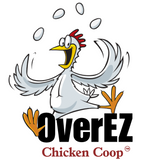Are you considering getting chickens for your backyard? Whether you're a seasoned homesteader or a first-time chicken keeper, one of the most important decisions you'll make is when to order your chicken coop. It's a classic chicken-and-egg scenario: do you get the chickens first or the coop?
In reality, it's best to have your coop ready before bringing home your feathered friends. Here's why:
Research and Planning:
Before ordering your coop, take the time to research different types of coops, materials, and sizes. Consider factors such as the number of chickens you plan to have, your available space, and local zoning regulations. Quality coops come in various designs, from traditional wooden structures to modern, easy-to-clean models. By doing your research upfront, you'll ensure you choose a coop that meets your needs and preferences.
Timing Is Key:
Chicks are typically ready to move into their coop at around 4-6 weeks old. However, they grow rapidly, so it's crucial to have a suitable living space prepared in advance. Ordering your coop ahead of time allows you to set it up and make any necessary adjustments before your chicks are ready to transition outdoors. This proactive approach minimizes stress for both you and your chickens and ensures they have a safe and comfortable home from day one.
Shipping and Delivery:
Consider the shipping and delivery times when ordering your coop. Some companies offer faster shipping options, while others may require longer lead times, especially for custom or made-to-order coops. Factor in shipping delays and delivery logistics to ensure your coop arrives in time for your chicks' arrival. Additionally, verify the delivery method and ensure your property is accessible for Freight or rollback truck deliveries.
Quality Matters:
While it may be tempting to cut costs by opting for a cheaper coop or delaying the purchase until later, investing in a quality coop upfront is essential. A well-built coop will provide adequate protection from predators, shelter from the elements, and proper ventilation for your chickens' health and well-being. Quality coops are also more durable and require less maintenance over time, saving you money in the long run.
Balance Cost and Quality:
When shopping for a coop, it's essential to balance cost and quality. While you don't want to overspend, skimping on quality can lead to costly repairs or replacements down the road. Consider factors such as materials, construction, and features like nesting boxes, roosts, and access doors. By choosing a coop that strikes the right balance between affordability and durability, you'll ensure a happy and healthy home for your chickens.
In the age-old debate of what comes first, the chicken or the coop, the answer is clear: the coop. By doing your research, ordering your coop in advance, and prioritizing quality, you'll set yourself and your chickens up for success. So, before you bring home your feathered friends, make sure their new home is ready and waiting. After all, a well-prepared coop is the foundation of a thriving backyard flock.


